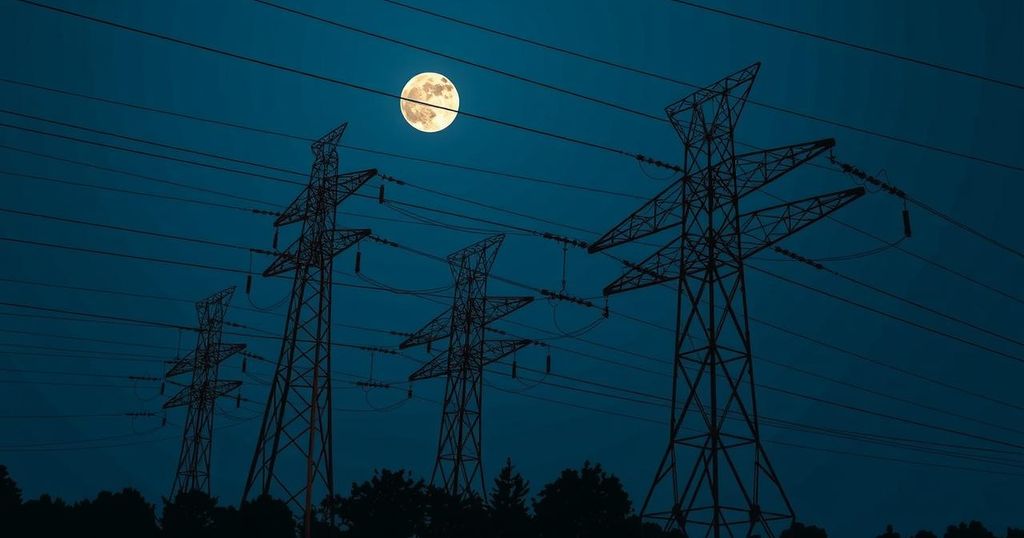Following a severe storm in São Paulo that left millions without power, discussions regarding the need for stronger regulatory frameworks for electric distribution networks have intensified. This comes in the face of increasingly extreme weather patterns, highlighting the necessity for adaptation and investment in infrastructural resilience to safeguard supply and public safety. Enel São Paulo plans substantial investments to improve network reliability while regulators explore new guidelines for sustainable energy management in a changing climate.
A recent storm in São Paulo resulted in severe power outages for approximately 3 million consumers, drawing critical attention to the necessity for regulatory reforms to enhance the resilience of the city’s electricity distribution network amidst escalating climate extremes. The electric sector has recognized the importance of this issue in recent years, particularly following successive significant storms that have darkened parts of Brazil’s largest city and placed power utility Enel São Paulo under scrutiny. In the wake of last week’s storm, which recorded wind gusts reaching 107 kilometers per hour and led to the collapse of extensive portions of the electric grid, discussions surrounding accountability among Enel São Paulo, the city administration, and public officials intensified. The frequency of extreme climatic events has notably increased, as evidenced by recent catastrophic storms not only in São Paulo but also in other regions such as Rio Grande do Sul, Ubatuba, and Recife, displaying a worrying trend that demands urgent attention from the electric utilities. Simultaneously, Brazil is grappling with unprecedented drought conditions, which further complicates the operational landscape for the power sector. Regina Célia dos Santos Alvalá, director of the National Center for Monitoring and Early Warning of Natural Disasters (CEMADEN), emphasized the need for adaptation: “Today’s climate is not the same as the climate of the past.” This highlights the transition that operators must undertake to prepare for new climate realities. The Brazilian Electricity Regulatory Agency (ANEEL) is currently exploring ways to foster network resilience through regulatory adjustments. This includes a public consultation aimed at reformulating concession guidelines set to expire after 2025. Investment strategies for distribution companies will not only impact tariffs but will also be designed to ensure the persistence of quality and safety in power supply. Bruna de Barros Correia, an energy attorney, articulated the shift in industry focus from reducing greenhouse emissions to enhancing preparedness against climatic adversities. She noted that current regulations fail to address the sufficiency of responses to emergency situations like the recent storm, suggesting the need for revisions to how interruptions are measured and compensated. In a recent press briefing, Enel São Paulo’s CEO, Guilherme Lencastre, advocated for modernizing concession contracts to include necessary preventive investments against adverse climate events, highlighting the unprecedented nature of the recent winds. Enel São Paulo plans to invest R$6.2 billion between 2024 and 2026 to bolster its infrastructure, intending to raise spending from R$1.4 billion to R$2 billion annually. ABRADEE, the Brazilian Association of Electric Energy Distributors, confirmed that a significant portion of the R$130 billion investment roadmap through 2027 will be dedicated to network improvements, with an uptick in annual expenditures aimed at ensuring structural resilience. The executive director at ABRADEE indicated that while establishing restoration timelines post-disruption can be intricate, enhanced technologies, such as “self-healing” networks, are being incorporated to expedite recovery processes.
The article discusses recent severe power outages in São Paulo due to extreme storms, which have prompted urgent calls for regulatory changes to enhance the resilience of the electric distribution grid. With the prevalence of extreme weather events, both storms and droughts, the electric sector faces a pressing need to adapt to these new challenges. The Brazilian Electricity Regulatory Agency is presently seeking ways to enforce resilience standards through regulatory measures and investment planning. The broader implications for public safety, company accountability, and consumer satisfaction are integral to the discussions surrounding this critical issue in the electric sector.
The article underscores the urgent need for significant regulatory and operational reforms within Brazil’s electric sector in light of escalating climate-induced challenges. With increasing frequency of extreme weather, particularly in São Paulo, it has become crucial for utilities to invest in resilient infrastructure while adapting to new climate realities as emphasized by various professionals within the sector. The imminent future of energy regulation will require careful consideration to ensure not only the reliability of power supply but also compliance with evolving environmental challenges.
Original Source: valorinternational.globo.com






